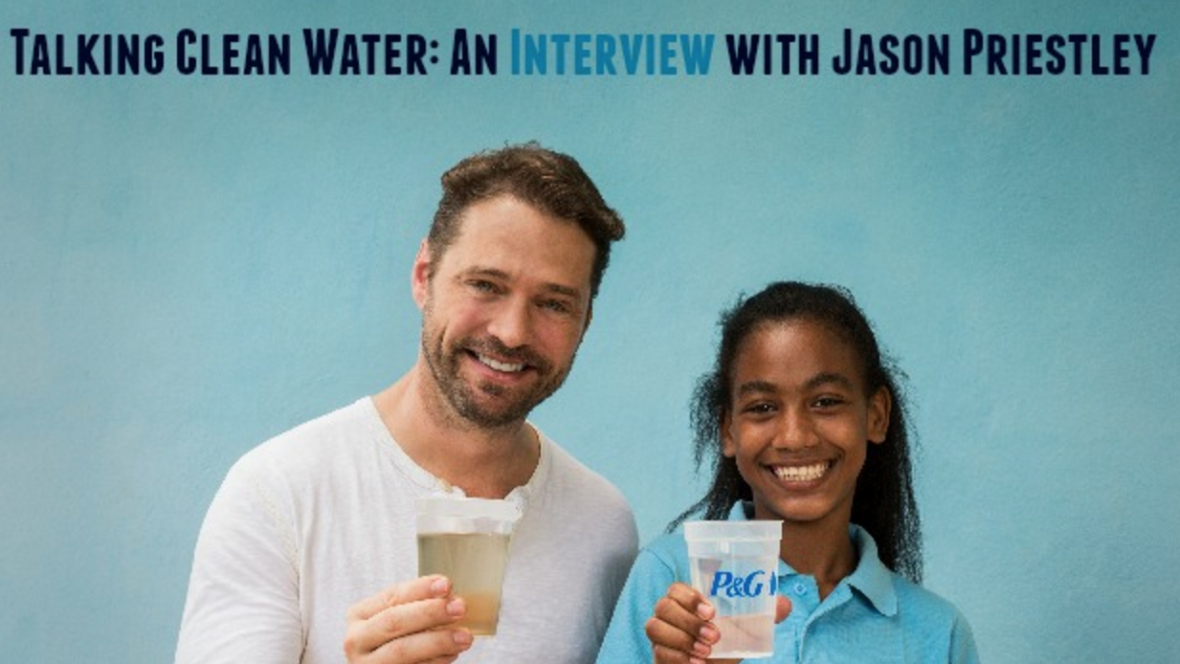Mentors and role models are crucial to our kids’ development. I am lucky that my kids are growing up in a community where they are influenced and guided by their elders, and are learning to mentor younger kids themselves.
How important is water? Very. A lemonade stand to raise funds for water wells is fabulous, but there are still 1800 kids who die EVERY DAY due to the lack of clean water in their communities. A billion people around the world don’t have access to safe water. Even with access to medications, people often take their pills with toxic water – it’s the only option.
A lack of education means that some wells are dug only feet away from the spots where latrines are situated, causing even more harmful bacteria.
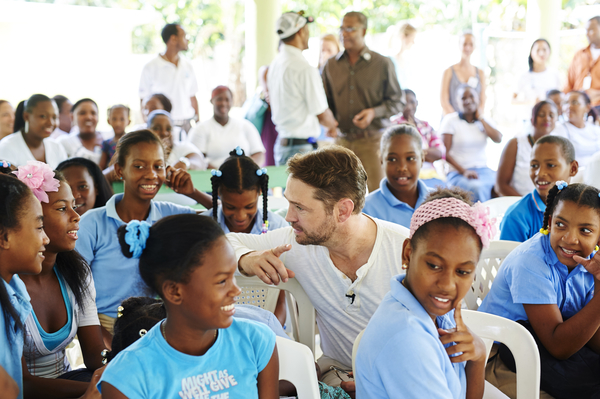 UrbanMommies had the opportunity to conduct an interview with Jason Priestley – actor, director and activist who travelled to the Dominican Republic and is working to promote the Children’s Safe Drinking Water program (CSDW). Since the program launched, it has succeeded in donating over 20 million days of clean drinking water to those in need, and we hope to reach our goal of 25 million days of clean drinking water by March 31, 2015.
UrbanMommies had the opportunity to conduct an interview with Jason Priestley – actor, director and activist who travelled to the Dominican Republic and is working to promote the Children’s Safe Drinking Water program (CSDW). Since the program launched, it has succeeded in donating over 20 million days of clean drinking water to those in need, and we hope to reach our goal of 25 million days of clean drinking water by March 31, 2015.
It doesn’t take a lot to make a big difference. Just 10 cents provides one P&G water purification packet that creates 10 liters of clean water. The packets are stirred into 10 litres of water and after ten minutes, the water can be strained through cloth (even a t-shirt works) and is safe to drink.
Just $1 gives a child clean water for 50 days.
$7.50 gives a child clean water for a year.
$30 gives a family clean water for a year.
Procter & Gamble and Walmart have partnered in a simple program to provide water to people in need. Every P&G product sold at Walmart Canada will provide 1 day of clean drinking water for a family. And these are the products you are buying anyway like Tide, Gillette, Bounce, Pantene and Tampax.
Here’s our exclusive interview with talented and kind Dad, Jason Priestley.
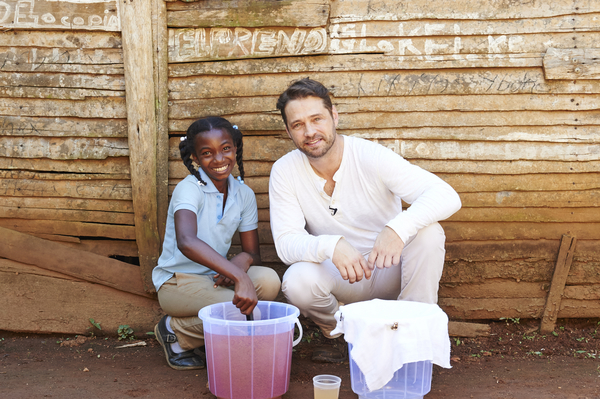 UM: There are so many charities and people in need – why water?
UM: There are so many charities and people in need – why water?
JP: I am a dad. 1600 children die every day. Its shocking to us who live in Canada where there in such an abundance of drinking water. This is a simple program that makes huge difference in people’s lives.
UM: I read your piece on your trip to the Dominican. When I travelled to Liberia with Right to Play I saw the need for clean water and also health education. How does Children’s Safe Drinking Water choose where to help? What about education?
JP: Kids can’t go to school half the time because they’re sick. There’s not enough education. We need to do something to break that cycle – water is one of the basic building blocks of society. Clean water makes people healthy and strong so they can get to school.
UM: You have 2 children – how to you teach them to be socially conscious?
JP: That’s one of the big challenges we all face. It’s difficult but I try to look at everything as a potential teachable moment. Scarcity and the importance of water is all around us – in California too. Water is a precious commodity. We talk a lot about the importance of helping others, not just giving people money but the tools they need to improve their lives. Teach a man to fish and he will eat for a lifetime. Water is a tool. It restores people’s health and also their dignity, improving their lives and the strength of the community.
UM: How can Canadians help?
JP: This is such a simple program. Go to a Walmart store or walmart.ca and buy the household products you use every day. P & G takes care of donating. It’s a 1 for 1 swap. 1 product = 1 day of drinking water for a family.
So far they’ve given 21 Million days of safe drinking water to families in developing countries.
UM: How do they determine where to distribute the water purification packets?
JP: They work with not for profit agencies across the globe to determine need. Unsafe drinking water kills more kids every year than HIV, aids and malaria combined.
UM: I know I went through many life changes after visiting Liberia. What was your big take-away, as a dad, after travelling to the Dominican?
JP: I loved the children. Children are the same everywhere you go: happy, joyous, playful and beautiful. There kids playing in the dirt with a ball and stick are no different than my children. I felt the need to help them. They are innocent, joyous and pure and they deserve better. We can see what the future hold for these kids even when they can’t.
A billion people don’t have access to safe water. 1600 kids die every day.
You can learn more at Walmart.ca/cleanwater
Disclosure: I am a P&G Mom and was give then chance to interview Jason Priestley. I was not compensated for this article and all opinions are my own.
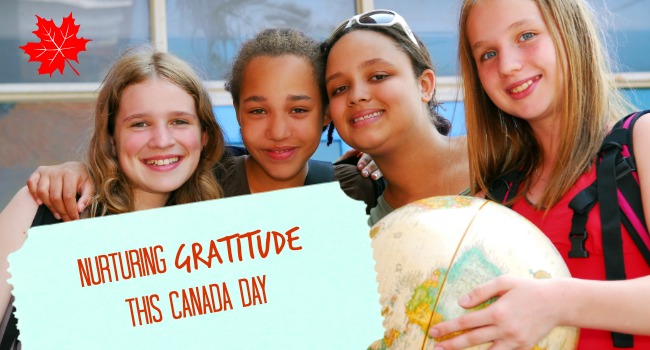 There are concrete blessings for kids who learn to count their blessings, the Wall Street Journal recently reported. In one study, high school students with high levels of gratitude reported having stronger marks, less depression and envy, and a more positive outlook than less grateful teens.
There are concrete blessings for kids who learn to count their blessings, the Wall Street Journal recently reported. In one study, high school students with high levels of gratitude reported having stronger marks, less depression and envy, and a more positive outlook than less grateful teens.
But gratitude is like a muscle – it needs regular exercise. You have to use it regularly if you want to see the benefits.
Canada Day is a great opportunity to nurture gratitude in our teens and younger children. As we prepare to celebrate with parades, fireworks and barbecues, we can also explore with our kids the many reasons why it’s great to live in Canada.
Here are five suggestions for building gratitude muscle this Canada Day:
1) Compare notes: Spend some time with a friend, acquaintance or neighbour who has immigrated to Canada. Encourage your kids to ask questions about life elsewhere. How is life different for kids here?
2) Dollar a day: Brainstorm over a meal about how living on a dollar a day would look. What would have to come off the dinner table to make the budget? What else would have had to go that day?
3) Watch the news: Have each family member recall a news story that makes them feel grateful to live in Canada. Share stories making the news, such as the war in Syria, or child slavery.
4) Pick a kids’ issue: Look together at a web site exploring a challenge affecting young people, like www.nochildforsale.ca or www.child-soldiers.org.
5) Start a tradition: Make an online donation to an organization helping children overseas, as a symbol of your family’s gratitude for life in Canada.
 Many parents are wakened on special occasions by an ominous clattering in the kitchen: loving-hearted children preparing to surprise us with coffee or hot chocolate in bed. There’s also that cinnamon toast or oatmeal positively doused with sugar.
Many parents are wakened on special occasions by an ominous clattering in the kitchen: loving-hearted children preparing to surprise us with coffee or hot chocolate in bed. There’s also that cinnamon toast or oatmeal positively doused with sugar.
What many parents don’t realize is that such meals usually come courtesy of a whole crew of children. Chocolate, coffee and sugar are often harvested by kids in developing countries. Some children are even trafficked – taken from their parents to be sold into slavery – onto plantations far from home. Others are forced into labour to help put food on the table at home.
Most Canadian parents struggle to keep costs down, yet our lower prices here are made possible by low pay overseas. Many children are forced to work for no pay, making our price tags even more appealing. Take cocoa for instance.
“An estimated 1.8 million children work to provide the world with its cocoa, in Cote d’Ivoire and Ghana,” says World Vision Canada’s Cheryl Hotchkiss. Hotchkiss explains that child workers are often trafficked – kidnapped and sold – into labour. They work in brutally dangerous conditions, with sharp machetes and toxic chemicals. Many are physically abused so they’ll work harder. Few are given adequate food or rest.
It’s easier to snuggle down under our covers than admit we live in a world where child labour is still prevalent. But it’s also pretty simple to do something to help change things. Fair trade cocoa, coffee, tea and sugar are available in many grocery stories. While they cost more, the payoff is much greater than a mouthful of sweetness.
“We made it into a field trip,” says Toronto mom Debbie Wolfe, of her first fair trade shopping trip with her two sons. “We stood in the grocery aisle, read the labels, and talked about how we’d be helping a real child and his family.”
“We’ve never enjoyed a cup of hot chocolate so much.”
To learn more ways to help end child slavery, visit www.nochildforsale.ca
Disclosure: This post was made possible through efforts of World Vision Canada.
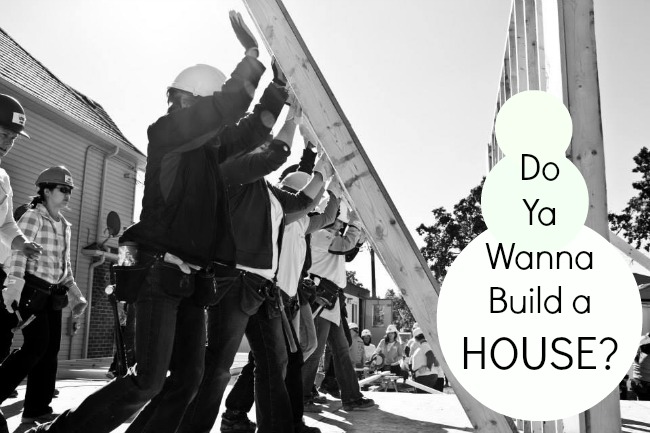 There have been many times over the years when I’ve wanted Elsa’s powers. Wouldn’t it be incredible if you could build a whole mansion with the flick of a hand like Disney’s Frozen star? Or maybe master a project that’s a tad less extensive – like tiling a floor, using a jigsaw or hanging a light fixture. There are thousands of people across the country who need housing, live in poverty and feel isolated. The power of community and charity can not only transform not only the individuals in need, but also empower the people who want to help others. There are problem-solving women across Canada who can help while working as a team and developing construction skills in the process. The women build with Habitat for Humanity does just this. Perfection!
There have been many times over the years when I’ve wanted Elsa’s powers. Wouldn’t it be incredible if you could build a whole mansion with the flick of a hand like Disney’s Frozen star? Or maybe master a project that’s a tad less extensive – like tiling a floor, using a jigsaw or hanging a light fixture. There are thousands of people across the country who need housing, live in poverty and feel isolated. The power of community and charity can not only transform not only the individuals in need, but also empower the people who want to help others. There are problem-solving women across Canada who can help while working as a team and developing construction skills in the process. The women build with Habitat for Humanity does just this. Perfection!
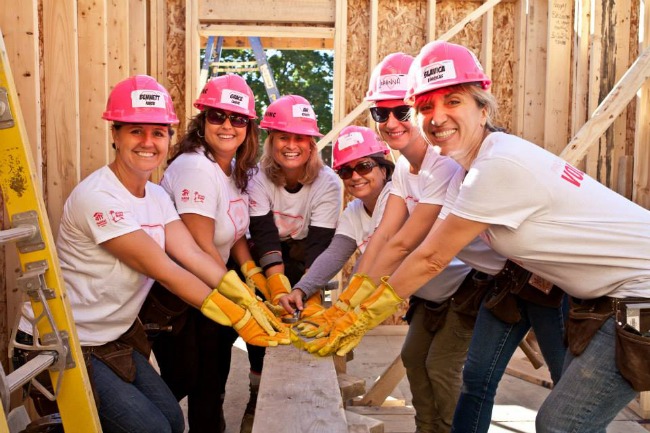 What family doesn’t want simple, decent and affordable housing? As an ambassador and fan of Procter & Gamble, I have been asked to represent UrbanMommies and put together a team of women in the Vancouver area to build a home! The program is part of a three year partnership totalling $900,000, that will see P&G support Habitat’s family home builds throughout the county, on behalf of its Household Needs brands such as Tide, Swiffer and Mr. Clean. This year there are builds happening in Toronto, Vancouver and Montreal and approximately 350 new builds are expected across Canada in 2014.
What family doesn’t want simple, decent and affordable housing? As an ambassador and fan of Procter & Gamble, I have been asked to represent UrbanMommies and put together a team of women in the Vancouver area to build a home! The program is part of a three year partnership totalling $900,000, that will see P&G support Habitat’s family home builds throughout the county, on behalf of its Household Needs brands such as Tide, Swiffer and Mr. Clean. This year there are builds happening in Toronto, Vancouver and Montreal and approximately 350 new builds are expected across Canada in 2014.
After a group of ten women (and any UrbanDaddies who wish to help) participate in a build in Richmond in September, P&G will offer cleaning kits to Habitat for Humanity affiliates to help ready the newly built homes for move-in once construction is complete, and will provide welcome baskets packed full of household products to each family moving into their new Habitat home. I am going to try to slip in a few Rainbow Loom treasures from my kids in as well. Because every new home needs some of those.
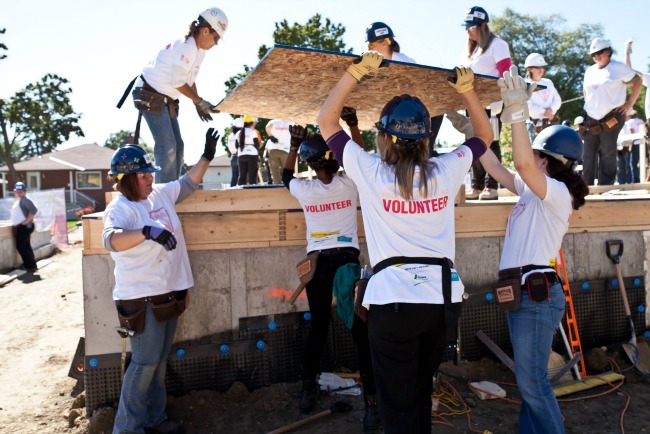 Habitat for Humanity is a special charity, and I love that one hundred percent of all administrative and fundraising costs are paid for by the operation of nine ReStores in the lower mainland. It’s great when not a dime is wasted.
Habitat for Humanity is a special charity, and I love that one hundred percent of all administrative and fundraising costs are paid for by the operation of nine ReStores in the lower mainland. It’s great when not a dime is wasted.
So… Do ya wanna build a house? Join our team in September for a one-day build! Learn new skills, bond, help others, and be a community. Because love is an open door. (You didn’t think I’d let the Frozen theme go that easily did you?) All Women Build photos provided by Habitat for Humanity.
 MATCH International is a grant-making agency that raises Canadian dollars (non-government) that are put directly in the hands of the communities who are fighting against female injustice. Is invests in social innovation by providing agency of change to those who need it most. MATCH believes that the ability for social change comes from within the community itself. They believe that it is the people who live within these communities who are most capable of identifying what needs to be changed in order to create gender equality, and creative ways to do it. So to them, and to me, it makes sense that they directly support the people and the projects that are most affected by the struggle.
MATCH International is a grant-making agency that raises Canadian dollars (non-government) that are put directly in the hands of the communities who are fighting against female injustice. Is invests in social innovation by providing agency of change to those who need it most. MATCH believes that the ability for social change comes from within the community itself. They believe that it is the people who live within these communities who are most capable of identifying what needs to be changed in order to create gender equality, and creative ways to do it. So to them, and to me, it makes sense that they directly support the people and the projects that are most affected by the struggle.
For example, in Malawi, young women were missing 3-5 school days a month when menstruating until MATCH funded a local program that allowed mothers to develop and produce locally-sourced cotton pads which were provided free to the students and sold within the community. This project provided a source of income for the mothers and markedly reduced the numbers of school days the young women were absent. On a larger scale, two years ago MATCH provided seed funding to the African Women’s Development Fund (AWDF) to foster programs working for social justice, equity and peace; today the AWDF supports 90 projects in 29 African countries.
I had the honour of speaking with Jess Tomlin today, the Executive Director of MATCH International Women’s Fund. Jess was in Toronto this week promoting their newest grantee partner and project: Boxgirls Kenya. This organization provides sport, leadership, and mentoring to over 800 Kenyan girls. It gives the girls a feeling of empowerment. It encourages them, their families, and the entire community to challenge the common perception of what girls can do, to see the world in a new light, and it allows them to think about how else their lives can be. This program yielded the first woman in Kenya to represent boxing for the Olympics games in 2012. This is the foundation of change that MATCH whole-heartedly strives to support.
Companies like MATCH and stories like these are the ones that inspire me to believe that we can change the world, that we can do more than just survive but thrive in bad situations. However, for every project that MATCH was able to fund this year, 80 projects had to be turned down due to lack of funding. MATCH was able to provide for 15 of the 1200 recent round of applications. That leaves hundreds of communities who have created goal-directed projects still in desperate need. Today I learned that of the money that Canadians spend on charity only 8% goes toward international causes: of that 8%, ½-¾ of this money is in response to a natural disaster – leaving 2% of Canadian donations going to all other international causes.
Jess Tomlin goes back to Ottawa today, in time to participate in the International Women’s Day on Saturday March 8th. This venue provides an opportunity to raise awareness and increase donations to MATCH so that this organization can continue to grow and advance the rights and equality of women around the globe by providing agency of change to those who need it the most.
– Colleen Docksteader
When my second son was born, we paid to have his cord blood banked and frozen in case anyone in the family became ill and in need of stem cells. Most families don’t have the luxury of this high-priced service and without a donor, Canadians can lose their lives. Science has come so far, but Canada is the only G8 country that doesn’t have a national public cord blood program. Currently there are 1000 people awaiting a stem cell match. Canadian Blood Services has launched the Climb4Cord to help change that. At a pricetag of $48 million, it is no small undertaking. As I write, my husband Derek Amery is representing UrbanDaddies by climbing Kilimanjaro for a Canadian blood cord bank. The 25 climbers had a goal of raising $500,000 and they have thankfully surpassed their goal.
What kid doesn’t want to set up on the front lawn with ice-cold lemonade and a cash box? Not only to pass the time and teach them some math skills, you can up the ante a bit by encouraging them to donate the proceeds to a charitable organization. Make a day of it with girly lemonade stands that help fellow women attain their basic rights in third world countries.
Small actions can drive big change. Plan Canada’s ‘Because I am a Girl’ initiative is helping to inspire youth to turn lemons into Pink LemonAid by hosting LemonAid fundraisers in their communities.
The girl issue is real, and it’s affecting girls and women around the world – but what is it? Girls in the poorest regions of the world are among the most disadvantaged people on the planet. They are more likely to live in poverty, more likely to be denied access to education, and more likely to be malnourished, simply because they are young and female.
And yet, studies show that when you invest in girls, the whole world benefits. If a girl has enough to eat, a safe environment, and an education, she’ll work to raise the standard of living for herself, her family and her community. And in time, she can even strengthen the economy of her entire country.
Did you know?
- 70% of the one billion people living in extreme poverty are women and girls.
- Girls are 3x more likely to be malnourished than boys.
- Globally, 66 million girls do not attend primary or secondary school.
There is an urgent need to stand up for the rights of millions of girls. In the poorest regions of the world, girls face double discrimination and unique barriers to survival and development, simply because they are young and female.
But when girls attain their basic human rights, they will:
- Be 6x less likely to be married as children
- Have 2.2 fewer yet healthier children
- Increase their contributions to household income by 18%
Pink LemonAid Kits full of helpful tips, educational materials and instructions on hosting can be downloaded online here. Moms can review the materials with their children and educate them on the importance of helping out girls from around the world who are less fortunate.

